I can able to run through locally. Getting error only in production build.
I have used
import { CommonModule } from '@angular/common';
imports: [ CommonModule ]
Full error is shown below.
client:101 Template parse errors:enter code here`Can't bind to 'ngIf' since it isn't a known property of 'div'.
("move" class="transport-remove">Remove</a></div>
<div id="carTypeDiv_1" class="veh-inv-out" [ERROR ->]*ngIf="vehicleData.vesselType == 'road'">
<ul id="carTypeList_1" class="veh-slides">
"): VehicleDirective@10:52
Property binding ngIf not used by any directive on an embedded template. Make sure that the property name is spelled correctly and all directives are listed in the "@NgModule.declarations". ("t:" (click)="removeField($event)" title="Remove" class="transport-remove">Remove</a></div>
[ERROR ->]<div id="carTypeDiv_1" class="veh-inv-out" *ngIf="vehicleData.vesselType == 'road'">
<ul "): VehicleDirective@10:9
Can't bind to 'ngForOf' since it isn't a known property of 'option'. ("l)]="vehicleData.makeSelect" (change)="appendModel($event.target.value)">
<option [ERROR ->]*ngFor="let make of vehicle.makes">{{make}}</option>
</select>
</div>
"): VehicleDirective@28:26
Property binding ngForOf not used by any directive on an embedded template. Make sure that the property name is spelled correctly and all directives are listed in the "@NgModule.declarations". ("[(ngModel)]="vehicleData.makeSelect" (change)="appendModel($event.target.value)">
[ERROR ->]<option *ngFor="let make of vehicle.makes">{{make}}</option>
</select>
</d"): VehicleDirective@28:18
Can't bind to 'ngForOf' since it isn't a known property of 'option'. ("t" id="modelSelect" [(ngModel)]="vehicleData.modelSelect" class="prefixbox">
<option [ERROR ->]*ngFor="let model of vehicle.models">{{model}}</option>
</select></div>
<br c"): VehicleDirective@36:23
Property binding ngForOf not used by any directive on an embedded template. Make sure that the property name is spelled correctly and all directives are listed in the "@NgModule.declarations". ("delSelect" id="modelSelect" [(ngModel)]="vehicleData.modelSelect" class="prefixbox">
[ERROR ->]<option *ngFor="let model of vehicle.models">{{model}}</option>
</select></div>
"): VehicleDirective@36:15
Can't bind to 'ngForOf' since it isn't a known property of 'option'. ("refixbox">
<option value="">SELECT</option>
<option [ERROR ->]*ngFor="let year of vehicle.years">{{year}}</option>
</select>
"): VehicleDirective@47:32
Property binding ngForOf not used by any directive on an embedded template. Make sure that the property name is spelled correctly and all directives are listed in the "@NgModule.declarations". ("class="prefixbox">
<option value="">SELECT</option>
[ERROR ->]<option *ngFor="let year of vehicle.years">{{year}}</option>
</select>
"): VehicleDirective@47:24
Can't bind to 'ngForOf' since it isn't a known property of 'option'. ("ateSelect" [(ngModel)]="vehicleData.stateSelect" class="prefixbox">
<option [ERROR ->]*ngFor="let state of vehicle.regStates">{{state}}</option>
</select>
"): VehicleDirective@55:32
Property binding ngForOf not used by any directive on an embedded template. Make sure that the property name is spelled correctly and all directives are listed in the "@NgModule.declarations". ("" id="stateSelect" [(ngModel)]="vehicleData.stateSelect" class="prefixbox">
[ERROR ->]<option *ngFor="let state of vehicle.regStates">{{state}}</option>
</select>
"): VehicleDirective@55:24
Can't bind to 'ngForOf' since it isn't a known property of 'option'. ("lorSelect" [(ngModel)]="vehicleData.colorSelect" class="prefixbox">
<option [ERROR ->]*ngFor="let color of vehicle.colors">{{color}}</option>
</select>
"): VehicleDirective@68:32
Property binding ngForOf not used by any directive on an embedded template. Make sure that the property name is spelled correctly and all directives are listed in the "@NgModule.declarations". ("" id="colorSelect" [(ngModel)]="vehicleData.colorSelect" class="prefixbox">
[ERROR ->]<option *ngFor="let color of vehicle.colors">{{color}}</option>
</select>
"): VehicleDirective@68:24
What is the reason. I have verified many solution. could not find the soultion. Same code is working fine with local.
